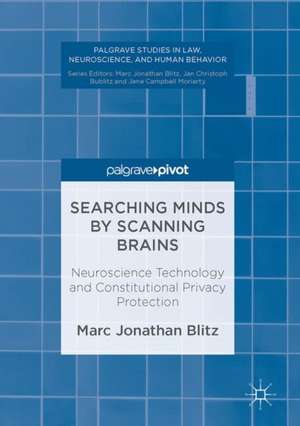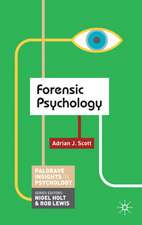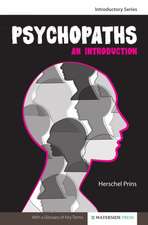Searching Minds by Scanning Brains: Neuroscience Technology and Constitutional Privacy Protection: Palgrave Studies in Law, Neuroscience, and Human Behavior
Autor Marc Jonathan Blitzen Limba Engleză Hardback – 27 mar 2017
This book examines the ethical and legal challenges presented by modern techniques of memory retrieval, especially within the context of potential use by the US government in courts of law. Specifically, Marc Blitz discusses the Fourth Amendment’s protections against unreasonable searches and the Fifth Amendment's self-incrimination clause. He also argues that we should pay close attention to another constitutional provision that individuals generally don’t think of as protecting their privacy: The First Amendment’s freedom of speech. First Amendment values also protect our freedom of thought, and this—not simply our privacy—is what is at stake if government engaged in excessive monitoring of our minds.
| Toate formatele și edițiile | Preț | Express |
|---|---|---|
| Paperback (1) | 411.75 lei 6-8 săpt. | |
| Springer International Publishing – 20 iul 2018 | 411.75 lei 6-8 săpt. | |
| Hardback (1) | 417.90 lei 6-8 săpt. | |
| Springer International Publishing – 27 mar 2017 | 417.90 lei 6-8 săpt. |
Preț: 417.90 lei
Nou
Puncte Express: 627
Preț estimativ în valută:
79.99€ • 84.04$ • 67.22£
79.99€ • 84.04$ • 67.22£
Carte tipărită la comandă
Livrare economică 11-25 martie
Preluare comenzi: 021 569.72.76
Specificații
ISBN-13: 9783319500034
ISBN-10: 3319500031
Pagini: 124
Ilustrații: VI, 144 p.
Dimensiuni: 148 x 210 x 10 mm
Greutate: 0.34 kg
Ediția:1st ed. 2017
Editura: Springer International Publishing
Colecția Palgrave Macmillan
Seria Palgrave Studies in Law, Neuroscience, and Human Behavior
Locul publicării:Cham, Switzerland
ISBN-10: 3319500031
Pagini: 124
Ilustrații: VI, 144 p.
Dimensiuni: 148 x 210 x 10 mm
Greutate: 0.34 kg
Ediția:1st ed. 2017
Editura: Springer International Publishing
Colecția Palgrave Macmillan
Seria Palgrave Studies in Law, Neuroscience, and Human Behavior
Locul publicării:Cham, Switzerland
Cuprins
1. Introduction.- 2. Constitutional Puzzles (and (Neuro)technological Changes.- 3. Lie Detection, Mind Reading, and Brain Reading.- 4. The Fifth Amendment: Self-Incrimination and the Brain.- 5. The Fourth (and First) Amendment.- 6. Conclusion.
Recenzii
“Searching Minds by Scanning Brains presents in-depth discussions of how the Fourth and Fifth Amendments have been used to make decisions about the constitutionality of brain scanning offered as evidence in criminal cases. … This book could be a very helpful text for law students, not only because of the resources and format of the book but also because of Blitz’s modeling of the disciplined logical and balanced thinking of an expert legal scholar.” (Patricia E. Freed, PsycCRITIQUES, Vol. 62 (32), August, 2017)
Notă biografică
Marc Jonathan Blitz is Alan Joseph Bennett Professor of Law at Oklahoma City University, USA, and series editor of Palgrave Studies in Law, Neuroscience, and Human Behavior.
Textul de pe ultima copertă
This book examines the ethical and legal challenges presented by modern techniques of memory retrieval, especially within the context of potential use by the US government in courts of law. Specifically, Marc Blitz discusses the Fourth Amendment’s protections against unreasonable searches and the Fifth Amendment's self-incrimination clause. He also argues that we should pay close attention to another constitutional provision that individuals generally don’t think of as protecting their privacy: The First Amendment’s freedom of speech. First Amendment values also protect our freedom of thought, and this—not simply our privacy—is what is at stake if government engaged in excessive monitoring of our minds.
Marc Jonathan Blitz is Alan Joseph Bennett Professor of Law at Oklahoma City University, USA, and series editor of Palgrave Studies in Law, Neuroscience, and Human Behavior.
Caracteristici
Will be of interest to researchers examining the implications that neuroscience has for legal questions Presents a novel exploration of the constitutionality of neuroimaging of certain mental activity, focusing especially on the Fourth, Fifth, First, and Fourteenth Amendments Represents an original contribution to the emerging field of neurolaw












